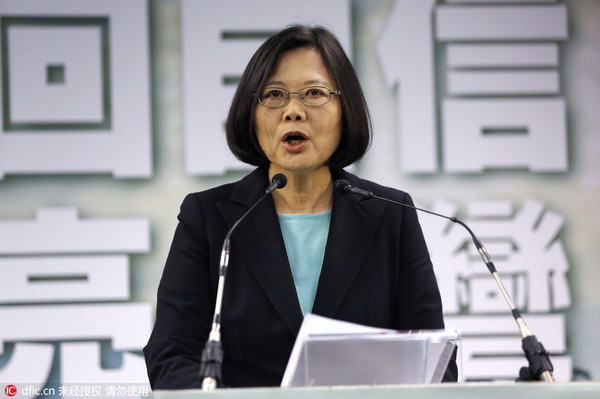 |
|
Taiwan's main opposition Democratic Progressive Party, DPP, Chairperson Tsai Ing-wen speaks during a press conference in Taipei, Taiwan, Wednesday, April 15, 2015. [Photo/IC] |
As many as 150,000 retired military personnel, civil servants and public school teachers took to the streets in Taipei on Sept 3 to protest against the government's pension reform plans, which they said were an insult to their professions.
The massive demonstration, arguably the first by Taiwan's public sector workers, is the latest challenge to the island's new administration led by Tsai Ing-wen, also chairwoman of the ruling Democratic Progressive Party. Previous reports suggested Tsai's approval rating fell below 50 percent-from more than 70 percent-on her 100th day in office.
The crisis was triggered by the authorities' attempt to slash the generous pensions for retired public sector employees, whom they accused of stealing from society. Given that the three groups are traditional supporters of the opposition Kuomintang, such reform plans appear suspicious under the name of promoting social justice.
It is unfair to blame retired public sector employees for the island's debts and financial crisis. It would be even more outrageous for the Tsai administration to make light of the losses it caused to the exchequer by using pension funds to bail out the stock market. Irrespective of what the plans' purposes are, Tsai has to take the public opposition seriously, instead of pursuing her political ambitions at the cost of retirees.
In fact, it is not surprising that Tsai has encountered a wave of problems just three months after taking office after the DPP swept the leadership election in January.
Starting with her inauguration speech on May 20, Tsai has been keeping her vague attitude on 1992 Consensus, forging closer ties with the United States and Japan, and distancing Taiwan from the Chinese mainland. Tsai's administration has done little to improve the economy and people's livelihoods, but exploited all possible resources to challenge the Kuomintang's legitimacy in order to strengthen its own.
Believing that once the largest opposition party is on the ropes it will pose no threat to its governance, the DPP, which controls the executive and legislative powers on the island, might not think twice before pressing ahead with its reforms.
But not just the public sector, Taiwan's tourism, fishery and agricultural sectors, too, are unhappy with Tsai's assertive proposals and very likely to voice their protest like the 150,000 retirees.
As one of the policy priorities, cross-Straits relations also demand Tsai's sincere efforts to get back on the right track. However, promising to "maintain the status quo", she has only undermined cross-Straits ties by refusing to acknowledge the 1992 Consensus, which stresses that the mainland and Taiwan both are parts of one China.
The suspension of communication and consultation mechanisms between the two sides has dealt a blow to Taiwan's tourism, fishery and agricultural sectors, adding weight to the fact that marginalizing political dissent at the cost of people's legal interests will be counter-productive, and that both sides of the Straits are interdependent in many ways. What Tsai and her DPP should do now is to acknowledge the 1992 Consensus and recalibrate cross-Straits relations toward peaceful development.
The author is a professor at the Institute of Taiwan Studies, Beijing Union University.